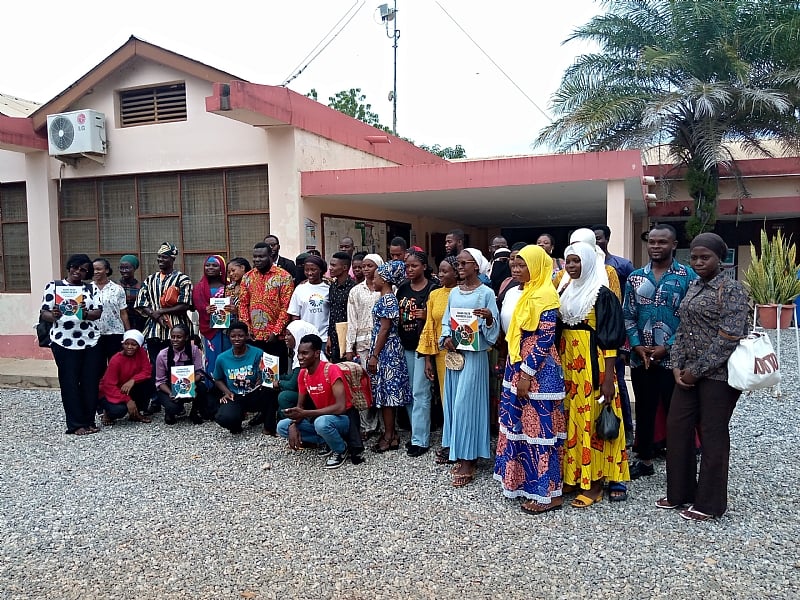The Wa Municipal Voices of Youth Coalition (VoYC), in collaboration with various youth groups and advocates through the Youth on Board (YoB) project initiated by the Youth Opportunity and Transformation in Africa (YOTA), recently hosted a youth dialogue focused on disseminating the findings of the 2024 Ghana Youth Barometer report. This report sheds light on young people’s perceptions regarding their education and future prospects in Ghana, especially in the context of challenges posed by the COVID-19 pandemic. The YoB project aims to amplify youth voices in advocating for heightened attention and investment in the educational sector to tackle critical issues of accessibility and quality. The interactive dialogue, held on October 1, 2024, in Wa, provided a platform for presenting these findings, engaging in panel discussions, and fostering direct interactions between key stakeholders and the youth attendees.
In her opening remarks, VoYC President Ms. Rahinatu Haruna underscored the pressing need for educational reforms that cater to the diverse requirements of all young individuals, regardless of their geographical location or gender. The coalition has been particularly focused on advocating for the re-enrollment of teenage mothers in basic schools, aiming to ensure that every girl has a second chance at education. This grassroots effort reflects a commitment to inclusivity and the empowerment of young women in their educational journeys. Such initiatives are essential not only for personal growth but also for the broader societal development that hinges on the potential of its youth.
The findings of the Youth Barometer report were shared by Mr. Hamid Alhassan Sokun, a youth researcher and VoYC member, who explained the study’s methodology, which involved a sample of 1,940 young individuals aged between 15 and 35 from across Ghana’s 16 administrative regions. The data revealed a concerning picture, with a significant portion of respondents—42.9 percent—believing that the education system is regressing, while 27.5 percent felt it was stagnating. Only 24.8 percent saw any progress. Those who viewed the system as developing cited improvements in access to education and infrastructure, while critics pointed to a curriculum that remains overly theoretical and disconnected from real-world applications as primary problems.
Despite these concerns, the report indicated that 52.5 percent of young Ghanaians felt that their education had adequately prepared them for future employment. The aspirations for self-employment were particularly pronounced, with 67.5 percent indicating a preference for pursuing this path, followed by 48.6 percent favoring public sector employment and 35.5 percent leaning towards private sector roles. However, significant barriers to achieving these aims were recognized, including a lack of necessary skills (62.5 percent), networking deficiencies (41.2 percent), and frequent health issues (35.2 percent). These findings highlight the complex interplay between educational quality and the employability of young people in Ghana’s rapidly evolving job market.
During a panel discussion, Key stakeholders provided insights into how youth can better prepare themselves. Madam Maria Johana Yuorpor, the Upper West Regional Coordinator of the Northern Development Authority, encouraged attendees to proactively enhance their skills and differentiate themselves to attract potential employers. Her emphasis on self-initiative points towards a broader approach that young individuals need to adopt for their own career readiness. Meanwhile, Madam Saudatu Mohammed, Executive Director of Life Again, called for collaborative efforts within the education sector to ensure that it remains responsive and aligns with the needs of the youth, reinforcing the importance of collective engagement in crafting a responsive educational framework.
The dialogue also addressed the prevailing attitudes towards education among Ghanaian youth. Lawyer Dawdi Mohammed Giyas, a lecturer at SDD University of Business and Integrated Development Studies, stressed the need for a mindset shift that values all forms of education rather than dismissing non-mainstream routes as inferior. This perspective is crucial as it promotes the understanding that diverse educational paths can lead to success and fulfillment, thereby encouraging a more inclusive approach within the youth. The YoB project, as part of YOTA’s broader vision, continues to address such systemic issues, supported by partnerships and contributions from organizations like 100% for the Children and Danish Civil Society in Development (CISU), aiming to foster a robust and transformative environment for the youth in Ghana.














